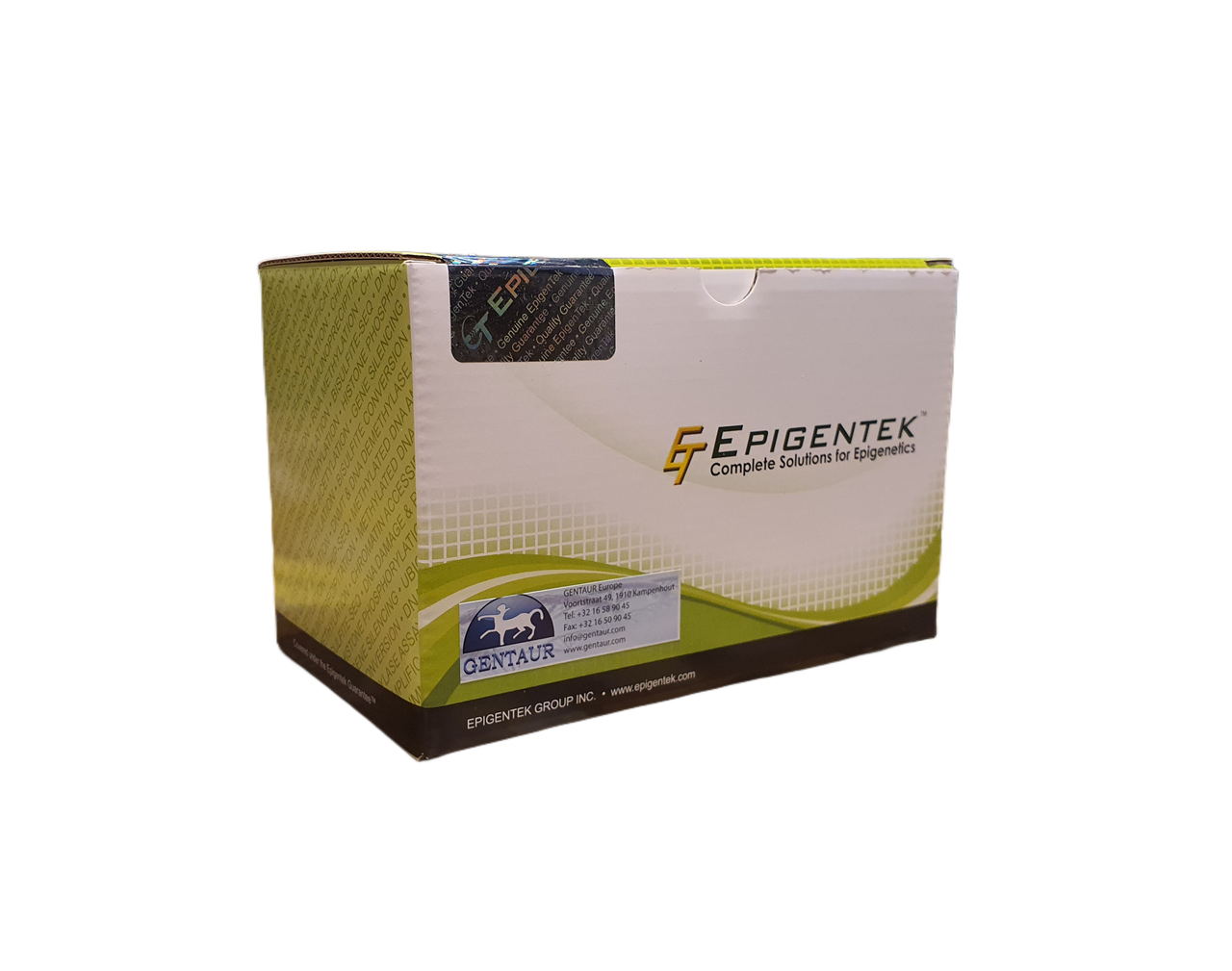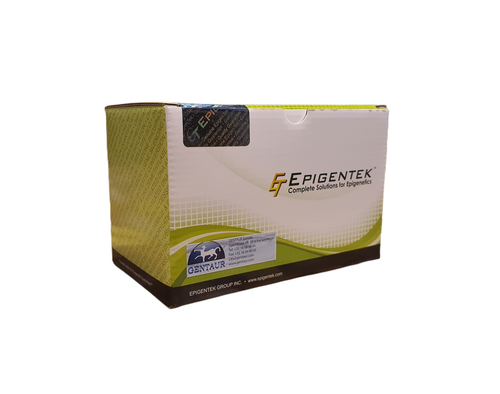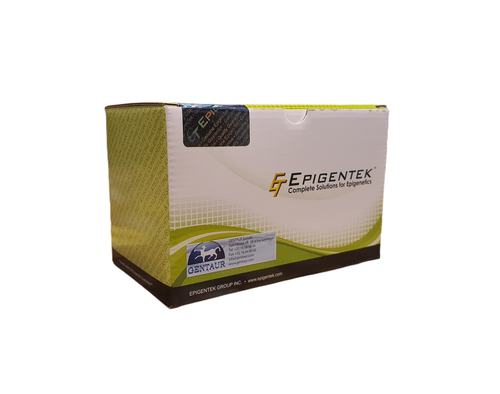Product Description
EpiNext ChIP-Seq High-Sensitivity Kit (Illumina) DataSheet
The EpiNext™ ChIP-Seq High-Sensitivity Kit (Illumina) is a complete set of reagents required for carrying out a successful ChIP-Seq starting from mammalian cells or tissues. The kit is designed to selectively enrich a chromatin fraction containing specific DNA sequences from various species, particularly mammals, and to prepare a ChIP-Seq library for next generation sequencing using Illumina platforms such as Illumina Genome Analyzer II, HiSeq and MiSeq systems. The optimized protocol and components of the kit allow capture of low abundance protein/DNA complexes with minimized non-specific background levels and the ability to construct both non-barcoded (singleplexed) and barcoded (multiplexed) ChIP-Seq libraries quickly with reduced bias. The kit has the following advantages and features:
- Optimized buffers and protocol allow minimal ChIP background by overcoming the weaknesses that cause non-specific enrichment, thereby increasing sensitivity and specificity of the ChIP reaction.
- Increased antibody selectivity and capture efficiency through the use of unique chimeric proteins containing the maximum number of IgG binding domains coated on the strip-wells. This allows strong binding of any IgG subtype antibodies within a wide pH range regardless if they are in monoclonal or polyclonal form.
- Highly efficient enrichment of targeted DNA. Enrichment ratio of positive to negative control > 500.
- High sensitivity and flexibility: Can be used for both non-barcoded (singleplexed) and barcoded (multiplexed) DNA library preparation. The input cell number can be as few as 50,000 cells with a range from 50,000 to 1,000,000 cells. A broad range of cell/tissue samples can be used, including samples with limited or tiny amounts of available chromatin.
- Fast and streamlined procedure: the procedure from cell/tissues to library DNA is less than 7 hours. No clean-up is required between each step from ChIPed DNA to size selection, and all reactions take place in the same tube, thereby saving time and preventing handling errors, or loss of valuable samples. Gel-free size selection further reduces the preparation time.
- Highly convenient: the kit contains all required components for each step of ChIP-Seq, which are sufficient for both ChIP and ChIPed DNA library preparation, thereby allowing the ChIP-Seq to be the most convenient with reliable and consistent results.
- Minimized bias: Ultra HiFi amplification and optional PCR-free step allow achievement of reproducibly high yields of DNA library with minimal sequence bias and low error rates.
Background Information
Protein-DNA interaction plays a critical role for cellular functions such as signal transduction, gene transcription, chromosome segregation, DNA replication and recombination, and epigenetic silencing. Identifying the genetic targets of DNA binding proteins and knowing the mechanisms of protein-DNA interaction on a genome-wide scale is important for understanding cellular processes. Chromatin immunoprecipitation (ChIP) followed by next generation sequencing (ChIP-Seq) offers an advantageous tool for studying genome-wide protein-DNA interactions. It allows for detection that a specific protein binds to specific sequences in living cells. In particular, ChIP antibodies targeted against various transcriptional factors (TF) for genome-wide transcription factor binding site analysis by Chip-Seq is in high demand. Such analysis requires that ChIPed DNA contain minimal background for reliably identifying true TF-enriched regions. Currently used ChIP-Seq methods play an important role in identifying genome-wide protein-DNA interaction. However, these methods still have several drawbacks: (1) large amounts of cell/tissues are needed for obtaining a sufficient yield of library DNA, therefore these methods cannot be used for biological samples such as tumor biopsy and embryonic tissues whose amounts are limited; (2) the background levels of ChIPed DNA are high; and (3) the procedures are time consuming (>3 days) and inconvenient. To address this issue, Epigentek developed the EpiNext ChIP-Seq High Sensitivity Kit (Illumina) by combining its microplate-based ultra ChIP and high sensitive DNA library construction technologies.
Principle & Procedure
The EpiNext ChIP-Seq High-Sensitivity Kit (Illumina) contains all necessary reagents required for carrying out a successful ChIP-Seq starting from mammalian cells or tissues. In the ChIP reaction, chromatin is isolated from cell/tissues and the target protein-DNA complex is immunoprecipitated using the antibody of interest. Immunoprecipitated DNA is then cleaned, released, and eluted. A positive control antibody (RNA polymerase II), a negative control non-immune IgG, and GAPDH primers are included in the kit, which can be used as a positive control to demonstrate the efficacy of the kit reagents and protocol. RNA polymerase II is considered to be enriched in the GAPDH gene promoter that is expected to be undergoing transcription in most growing mammalian cells and can be immunoprecipitated by RNA polymerase II antibody but not by non-immune IgG. In the library preparation, ChIPed DNA fragments are end repaired and dA tailed (end polishing) simultaneously. Adaptors are then ligated to both ends of the polished DNA fragments for amplification and sequencing. Ligated fragments are size selected and purified using MQ binding beads, which allows quick and precise size selection of DNA. Size-selected DNA fragments are amplified with a high-fidelity PCR mix which ensures maximum yields from minimum amounts of starting material and provides highly accurate amplification of library DNA with low error rates and minimum bias.
Starting Materials
Starting materials can include various tissue or cell samples such as culture cells from a flask or plate, fresh and frozen tissues, etc.
 Euro
Euro
 USD
USD
 British Pound
British Pound
 NULL
NULL












